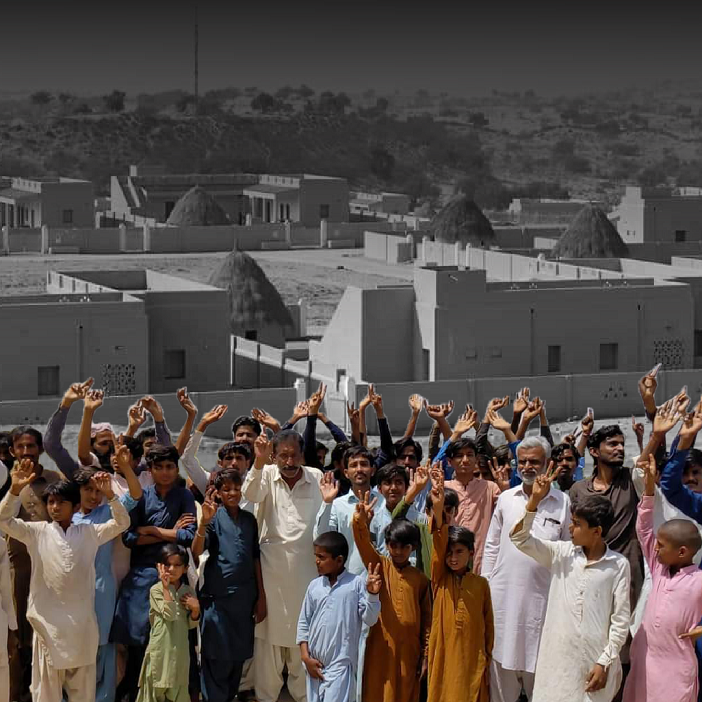Five years have elapsed since Thano Bheel, an 80-year-old woman, moved to the ‘model’ village. She used to live with her family in Senhri Dars, a small village located 16km north of Islamkot where many Hindu and Muslim families lived side by side for centuries.
That was before the government discovered coal there and decided to mine it for thermal power. According to Bheel, the residents were alarmed at this development from the get-go.
“Soon, the entire village began shrinking. Agricultural land and grazing fields for cattle were swallowed up [by the coal project],” she laments.
“Initially, we were not willing to leave our ancestral land but the government plied us with all sorts of promises. They told us about ‘model’ villages where development was underway. They also promised that we’d find employment there. That was when we decided to leave,” says Bheel.
Now Bheel and her husband live in a ‘model’ village with their two sons but the family is facing a lot of challenges. Neither of Bheel’s two sons got employed by the coal company. That’s why they moved to the irrigated areas and started working as farmhands.
“A more pressing issue is the condition of the houses allotted to us. They have deteriorated drastically within just five years. We’re worried that the roof might cave in on us,” complains Bheel.
Not just Bheel but almost all the residents of this ‘model’ village, situated in Thar Coal Block-II, are apprehensive. They even staged a protest on June 20, hoping to be heard by the authorities.
The resettlement plan and ‘model’ village
Senhri Dars was one of the first places to be selected for Thar coal mining project in 2014. The village was included in the open-pit mining area of ‘Coal Block II’.
A contract was signed and the villagers were resettled in a ‘model’ village established by the Sindh Engro Coal Mining Company. The framework for this ‘model’ village had already been finalised by the Sindh government.
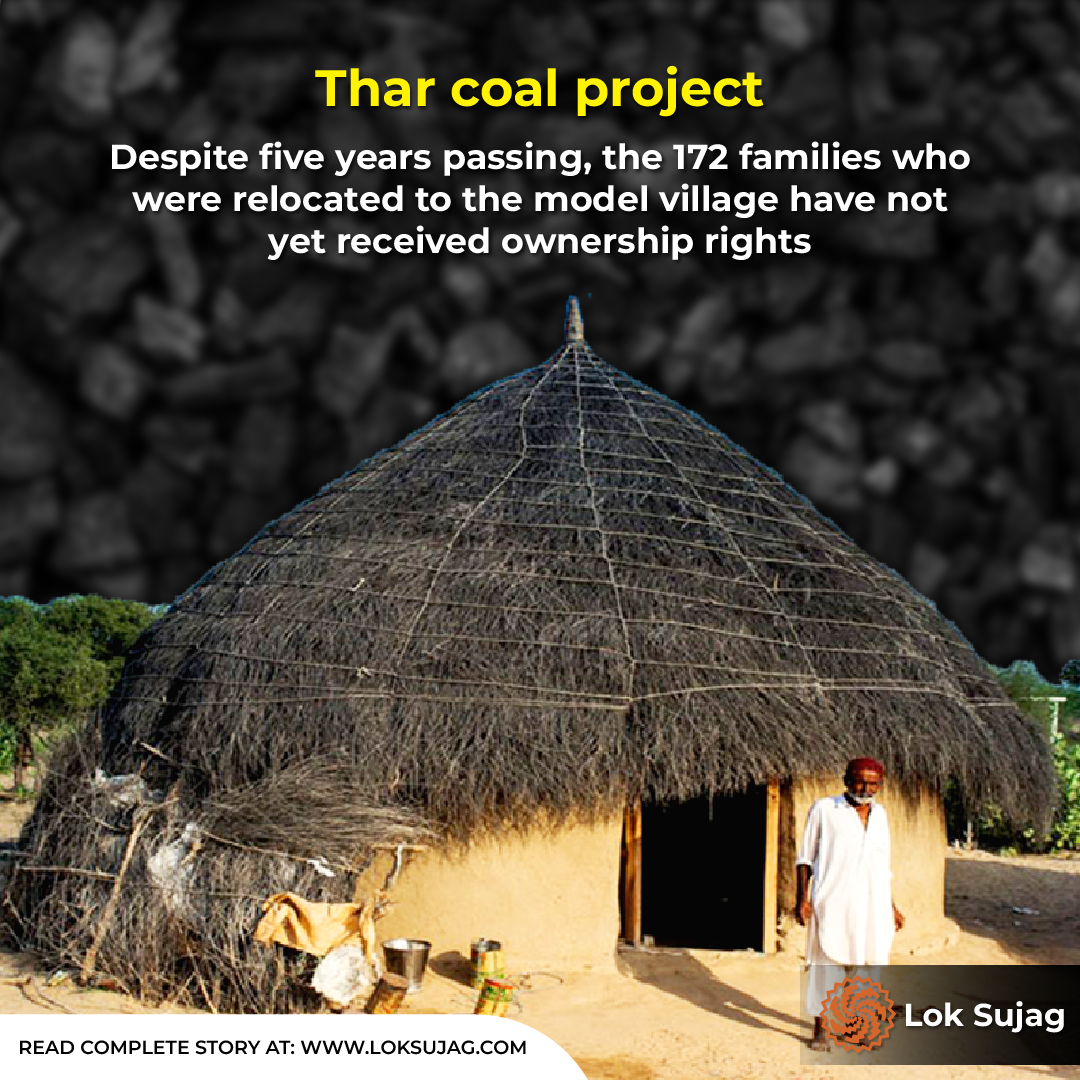
The contract was signed on Jan 20,, 2016. It bears the signatures of the residents of Senhri Dars and Farhan Ansari, a representative of Sindh Engro Coal Mining Company. The contract says that it is inevitable that the mining activities would affect the lives of villages. It says they will be relocated in the vicinity of Block-II. “The company representatives and the villagers have already reached a consensus on the site [for relocation],” it reads.
The contract also says that each married couple would be allotted a 1,000 yards house complete with a bathroom, electricity supply and a boundary wall. It also states that the ‘model’ village will have at least one RO plant for water and a functional water supply scheme. A school and a health facility would also be constructed as well as a mosque and a temple. Each street would have a reserved area for cattle. It further says that land would be set aside for two separate graveyards; one for the Muslims and the other for the Hindus.
In addition, the ‘model’ village would house a market, a park, two community centres, a sports ground and a guesthouse while 850-100 acres of land would be set aside for grazing cattle, according to the contract.
After the contract was signed, Sindh Engro Coal Mining Company set up the Thar Foundation, a non-profit organisation, as a part of their corporate social responsibility initiative and began working on the ‘model’ village.
Allegations of unkept promises
Residents of ‘model’ village claim that both the government and the company have failed in fulfilling their promises and the terms of the contract signed have not been fulfilled. “We’ve been abandoned in a helpless state. Nobody is there to lend an ear to our concerns.”
Nabi Bakhsh Dars (38) is one of the people who signed the contract and is now residing in the ‘model’ village. “When the village was surveyed in 2014, 182 families were being displaced but the company committed [in the contract] to construct only 172 houses,” he says.
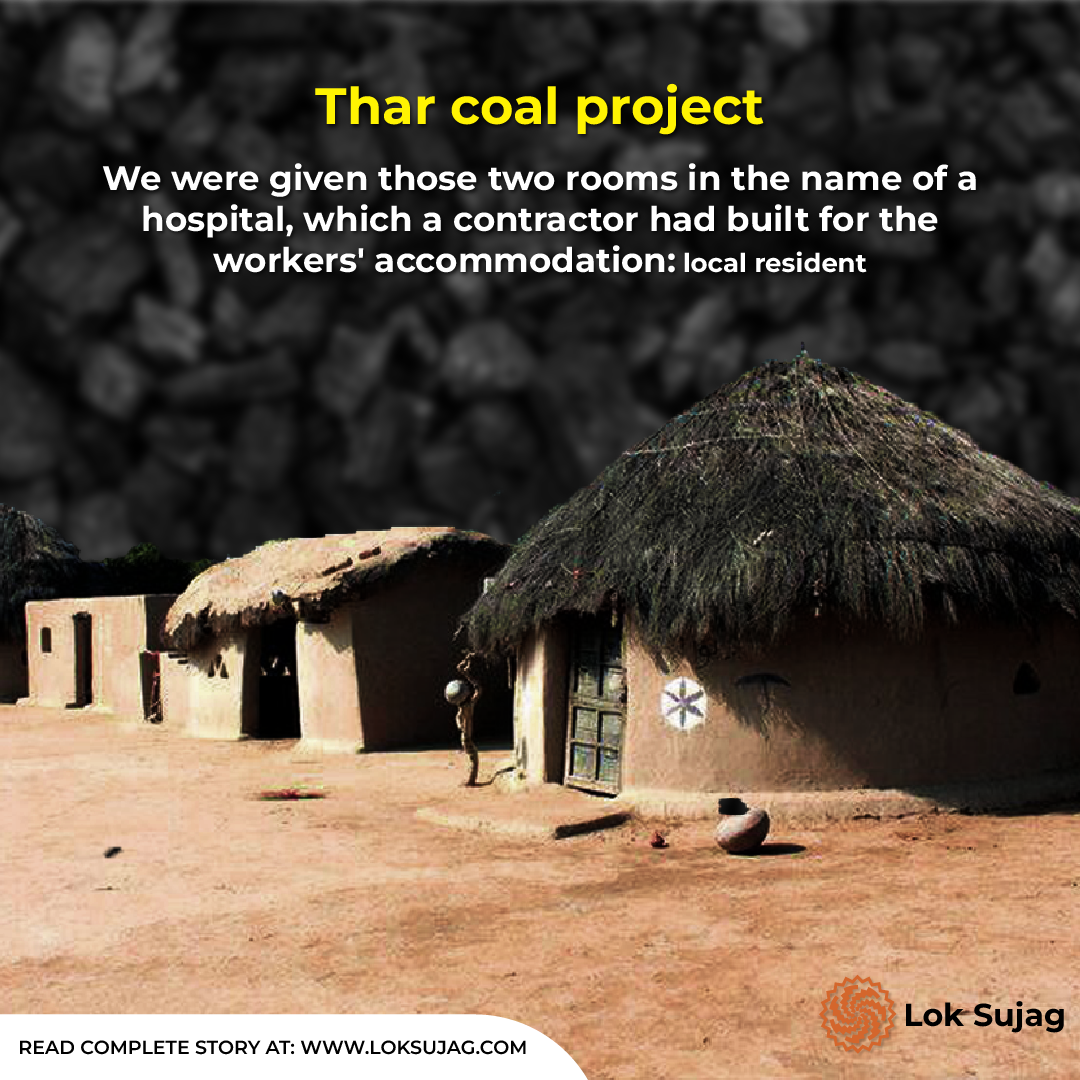
“By the time people started moving in 2018, 30 more young people got married. We demanded that the company construct 40 additional houses [to accommodate them]. Our demand was accepted [by the company] but nothing was done about it,” he complains.
According to Dars, it was also decided on the occasion of the inauguration of the Coal Block-II and power plants that each family would be given Rs100,000 annually as well as free electricity.
“While the residents of the model village are being paid the amount, this sum is not sufficient because inflation has increased. The inflation rate has not been taken into account. Besides, other promises to provide villagers with free electricity, education and employment have not been fulfilled,” he alleges.
Dars says that many houses in the ‘model’ village are in a state of disrepair, posing a risk to the residents. “Cracks have appeared in the walls. Nobody [from the company] is taking the responsibility to renovate the houses. The huts we were shifted to aren’t climate resilient. We have apprehensions regarding the monsoon this year. If it rains too much, the roof might cave in, killing or injuring people,” he says.
Coal mining firm has other claims
Now, after constructing the ‘model’ village and resettling people there, the company claims that it has held its end of the bargain.
In response to a questionnaire sent via email, representatives of the Sindh Engro Coal Mining Company state that the company stands by its stance of cooperating and assisting the local communities. “That was why the ‘model’ village was set up with consensus of residents and local elders,” says the email.
“The model village has two RO plants, a dispensary, a school, a bazaar, a mosque, a temple, a sports ground and two separate gender-segregated community halls. Every household receives 100 units of free electricity and Rs100,000 annually while 850 acres of land next to the village has been set aside as grazing grounds for cattle.
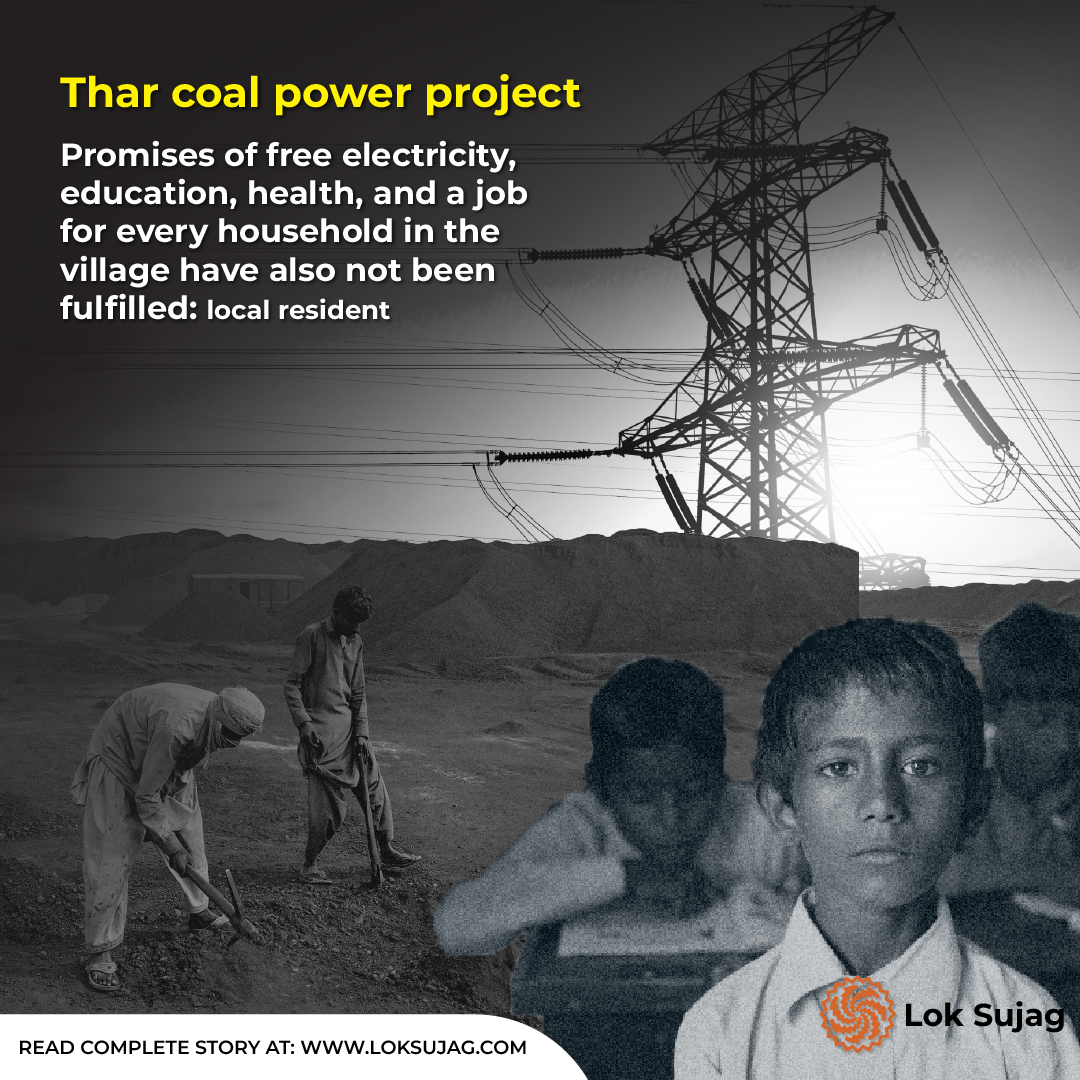
“As a responsible company, we also pay royalty to the Sindh government,” it states.
The company officials also claim that each house comprising of 1,100 sq yards has three rooms, a storeroom, a kitchen and a shed for cattle.
“Solar panels have been installed at every house,” reads the email and adds, “Repair and maintenance of these houses is the responsibility of the residents since they have moved in already.”
Third-party endorses locals’ claims
Sources in the Thar Foundation have also confirmed that the residents have genuine reservations about the state of affairs.
An official, on the condition of anonymity, informed Lok Sujag that the company got funds to the tune of Rs6.7m approved from the Sindh government for construction of each house but it disbursed only Rs3.9m per house to the local contractors. The contractors finished the construction by Dec 15, 2018.
“Of this amount, the local contractors were paid Rs3.6m per house. The project manager also warned that the houses being constructed were not up to the mark. The contractors protested for a while when Rs300,000 were deducted from the amount [per house] owed to them but then their protests fizzled out,” informs the official.
Dying cattle and people ditched by Sindh govt
On April 10, 2019, two coal plants were inaugurated by Pakistan People’s Party Chairman Bilawal Bhutto-Zardari and the Sindh chief minister in Thar. These plants were to produce 660MW of electricity.
Ramchand Kolhi, a farm worker, says that at the time of inauguration, Sindh Chief Minister Murad Ali Shah had promised that 3pc of the money saved due to the coal plants would be spent on the welfare of the local population but that did not happen.
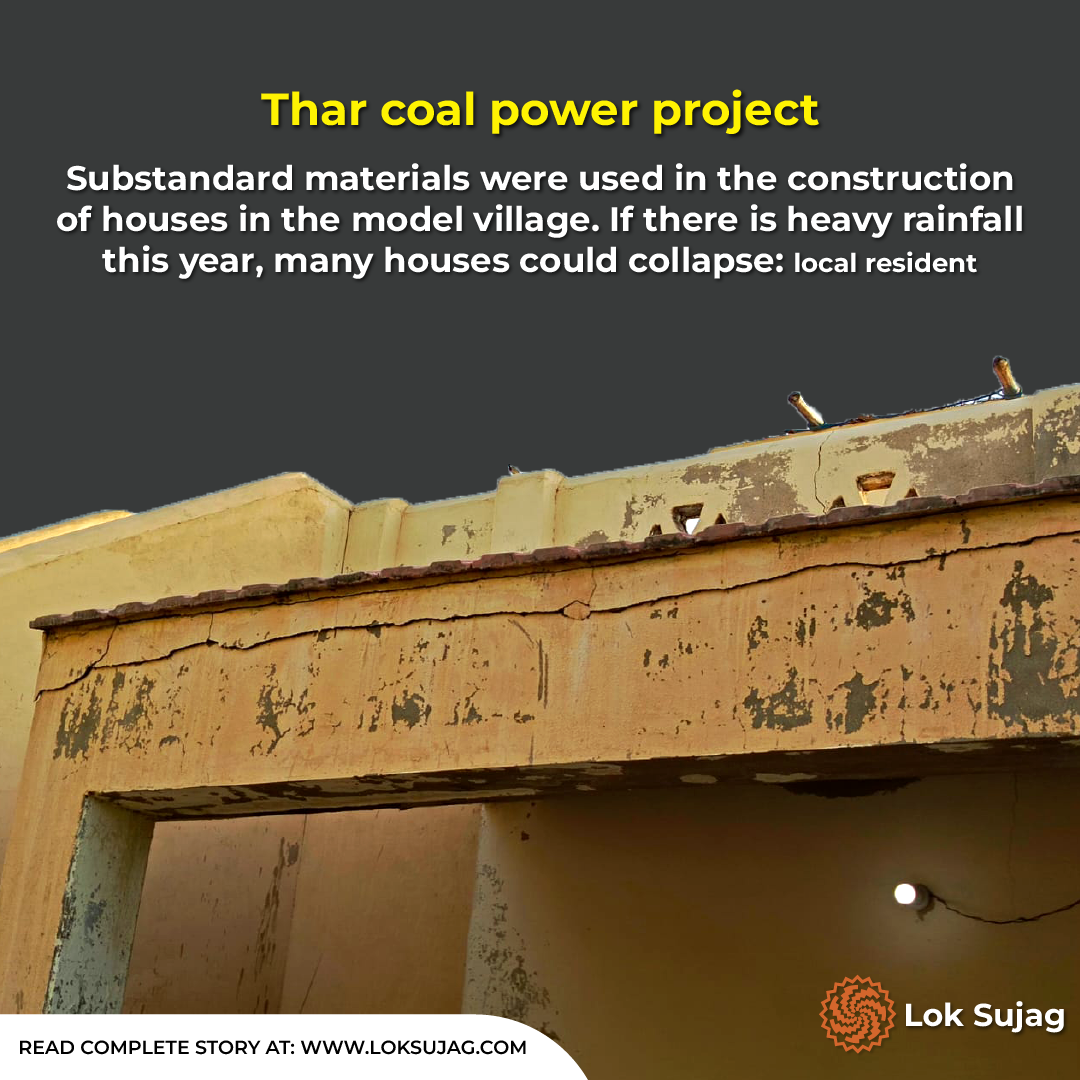
“For the first two years, we did not receive our electricity bills so we assumed that the company was paying them. Then, we abruptly began receiving bills. Some residents were charged as much as Rs100,000 for availing electricity; others were charged Rs200,000. We protested but nobody listened to us,” complains Kolhi.
“Five years have passed since the ‘model’ village was established but the 172 families that moved there are yet to receive ownership rights [of their houses],” says Kohli.
“Since the grazing area for our cattle was insufficient, we also demanded that a new grazing area [outside the boundary wall] be established as an alternative but nobody paid heed to our demands. As a result, over 2,500 of our sheep, goats and cows died. People had no choice but to sell their cattle,” he adds.
More broken promises
Speaking of the contract, Dars says the company had also promised that it would allocate a portion of the royalty it received to a scholarship programme for local students.
“Not a single student received any scholarship,” he says.
“The contract stated that the company would establish a park in the ‘model’ village but it didn’t do so. We still have no park,” says Dars.
“In place of a proper hospital, we have to make do with two rooms that were initially constructed by the contractor as makeshift accommodation for labourers. The medical facility in our old village was purpose-built with five rooms. We were better off with it,” says Dars.
“Don’t go by the name of this place,” he says dejectedly, “it is called a ‘model’ village but it doesn’t have any facilities. The houses were built from substandard material – and we still don’t have ownership,” says Dars.
Also Read
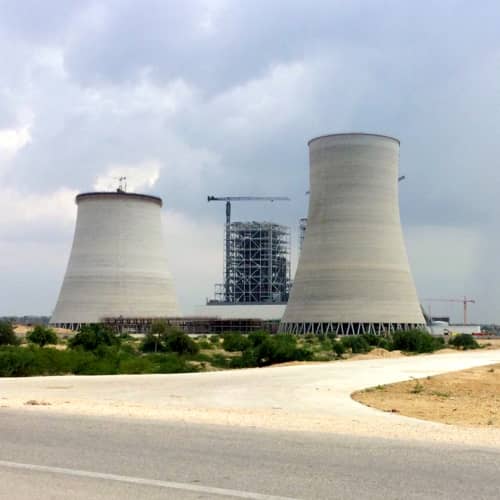
Coal-fired power plants in Thar: 'Our lands are being taken away and our way of life is being changed'۔
Comrade Nandlal Malhi, the regional spokesman for the PPP and the founding member of Tharparkar Coal Action Committee, agrees that the coal company has turned back on many promises it made to the villages. “That’s why, they are protesting,” he says.
Malhi, who visited the ‘model’ village only a week ago, confirms that the residents are unhappy there because they are facing many issues.“These range from basic needs such as water supply, electricity and employment to education and security concerns,” he says. “Besides, the ownership of the huts is yet to be transferred to the villagers.”
The company stands its ground
However, representatives from the Sindh Engro Coal Mining Company deny that the company has violated any terms of the contract.
While speaking to Lok Sujag, Amir Iqbal, the chief executive officer of the company, maintains that the residents of Senhri Dars have been shifted to a model village ‘…of excellent level.’
“Look at the Tarbela Dam affectees. Years have passed but their issues are yet to be resolved. Here at Thar coal ‘model’ village, we have provided the residents with every facility, including a mosque, a temple, a school and much more,” claims Amir.
He says that, according to a survey conducted in 2014, there were 172 registered households in Senhri Dars. “But if the number of households has really increased and the villagers are facing a problem because of it, they can always lodge a petition with the Tharparkar deputy commissioner. We’re willing to follow governmental policy,” he says.
He further says that the company is disbursing Rs100,000 to each family on an annual basis. “If they [the residents] want the stipend to be increased, they should take up this matter with the government.”
“As for the repair of the houses, that’s the responsibility of the residents. It is the same way all over the world. The company will not renovate the houses,” he maintains.
Kanwar Karni Singh Sodho, a PPP politician who recently got nominated as a member of the Thar Coal Energy Board, says MNA Dr Mahesh Malani is already overseeing the matter and engaging with the villagers.
“The provincial government has always assisted the affectees and is willing to do so on a priority basis in the future,” claims the politician.
Nabi Bakhsh Dars, however, is skeptical of these promises. He says that after 20 June, the residents of the ‘model’ village plan on returning to their old village, setting camp there and protesting until their demands are heard.
Published on 4 Jun 2024
